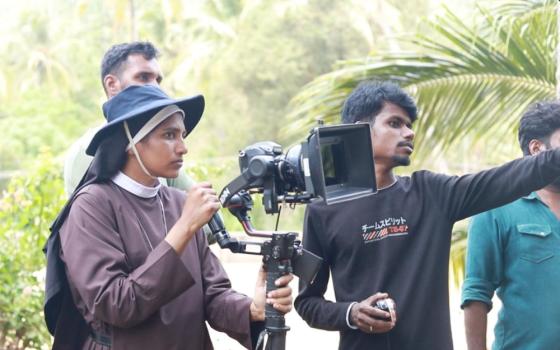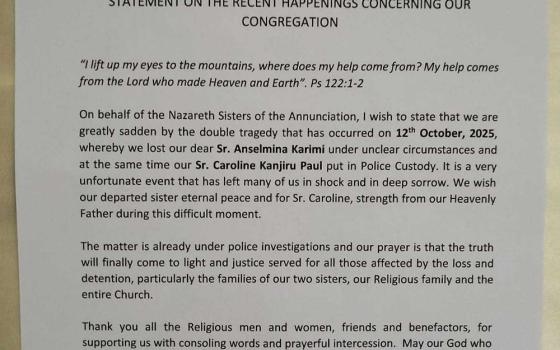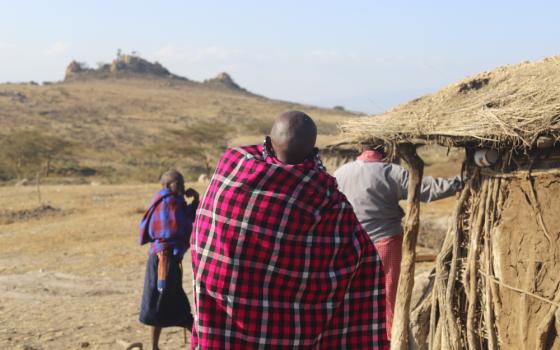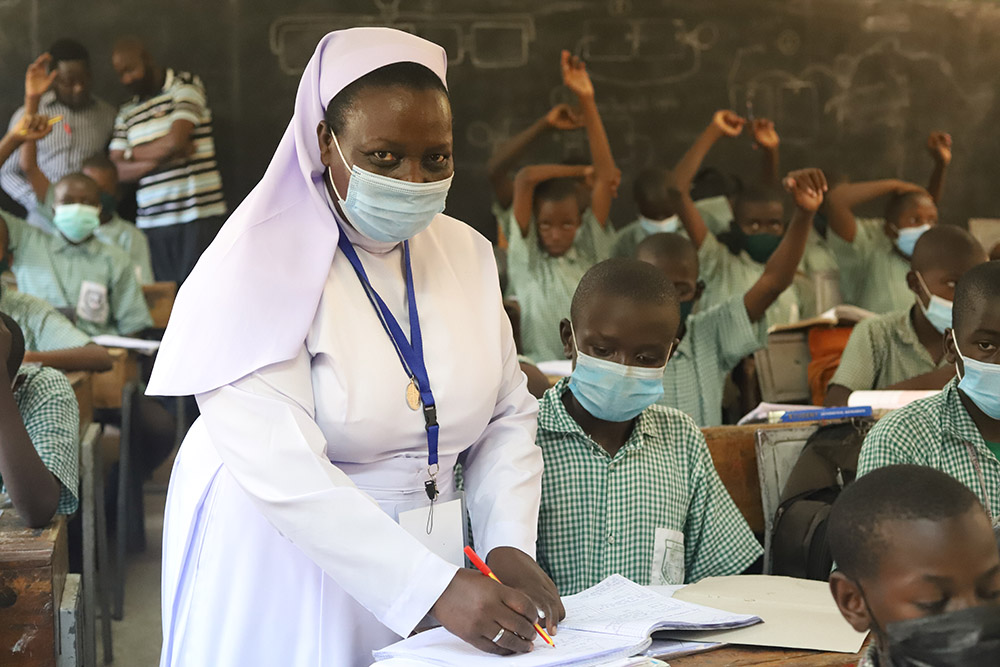
Sr. Anne Onyancha helps a boy with his studies at St. Peter's Mumias Boys Primary School in Kakamega, Kenya. (GSR photo/Doreen Ajiambo)
It is 8 a.m., and Sr. Anne Onyancha heads to class to teach her Grade 8 students at St. Peter's Mumias Boys Primary School in this town 250 miles northwest of Nairobi, the capital of Kenya.
Onyancha, a member of the Sisters of Mary of Kakamega, is determined again to emerge among the best teachers in next year's national examinations, the Kenya Certificate of Primary Education. During this year's celebration of World Teachers' Day, Onyancha was recognized by her employer, the Teachers Service Commission, for managing her school, which ranked among the top-performing schools in the country.
"I am motivated to work hard after receiving the award from my employer during this year's World Teachers' Day," said Onyancha, who is also the head teacher of her school. "I cannot even explain my joy. The award came as a surprise because we have very many good-performing schools in the country. I thank God, and I want to feel the same joy next year."
The 59-year-old nun was among 31 teachers across Kenya who were honored in October. Two of the nearly 2,000 students in her school were among the top 20 in the last year's national examinations.
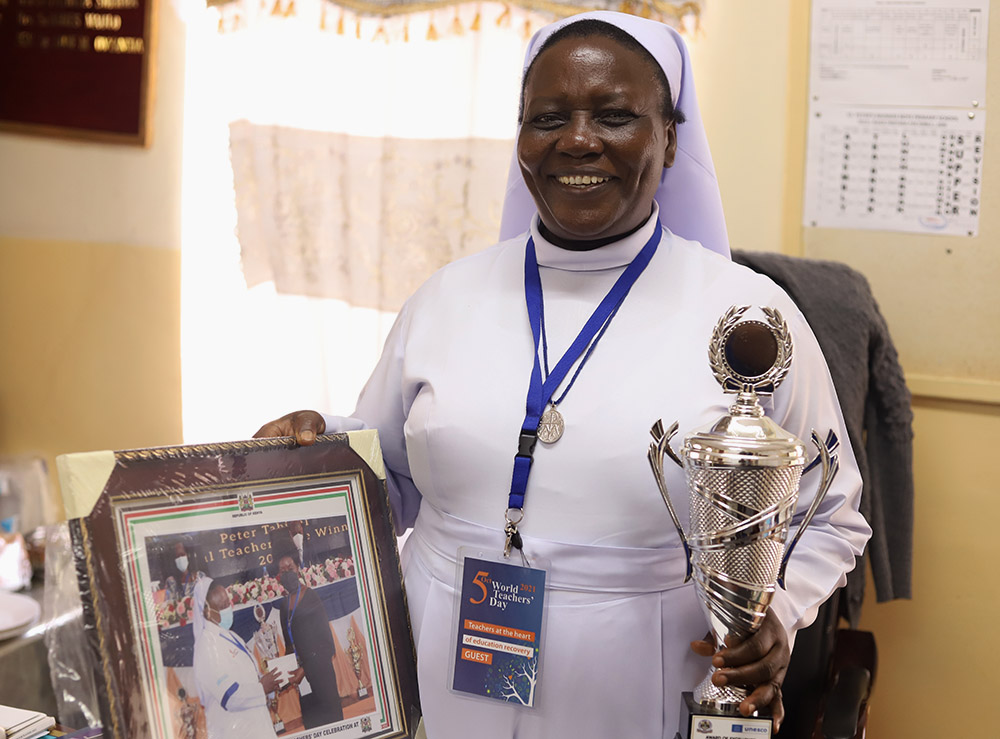
Sr. Anne Onyancha, a member of the Sisters of Mary of Kakamega and head teacher of St Peter's Mumias Boys Primary School in Kakamega, Kenya, displays the trophy she was awarded for ensuring quality education in Kenya. (GSR photo/Doreen Ajiambo)
Nancy Macharia, chief executive officer of the Teachers Service Commission, praised the teachers for ensuring that learners get quality education despite the COVID-19 pandemic.
"You are truly the cornerstone of the country's positive trajectory on the path to education recovery during the COVID-19 era," Macharia said.
World Teachers' Day honors teachers for their role in the education and development of future leaders. The United Nations Educational, Scientific, and Cultural Organization (UNESCO) created the celebration in 1994.
GSR: Who is Sr. Anne Onyancha, and how has your journey been?
Onyancha: I joined the sisters of Mary of Kakamega in 1983 and began formation. After formation, I worked for 18 months taking care of sick sisters and the old. I joined Eregi Teachers Training College, located in Kakamega town in western Kenya, where I graduated after two years.
I immediately joined St. Mary's Nyamagwa Girls' Primary School in Kisii, southwestern Kenya. After working for five months as a teacher, I was asked to act as a deputy head teacher after the nun who was the head teacher was transferred.
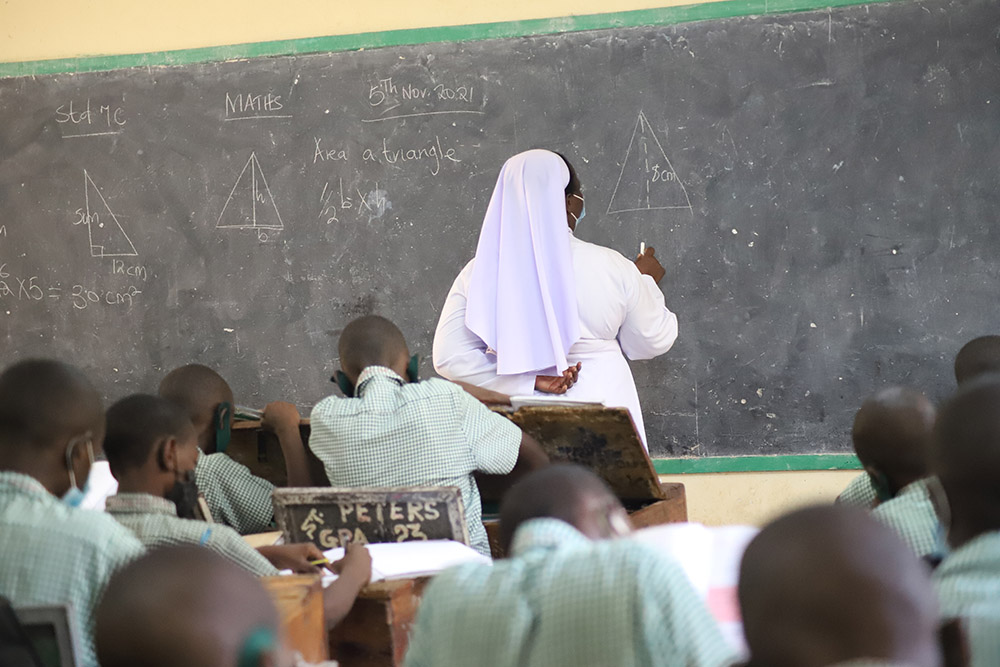
Sr. Anne Onyancha teaches a mathematics lesson at St. Peter's Mumias Boys Primary School in Kakamega, Kenya. (GSR photo/Doreen Ajiambo)
I held the position for 18 months until the superior general asked me to come to St. Aloys Ojola Primary School in Kisumu, a city in western Kenya. Since the Kisumu Diocese was interested in starting a boarding school for the boys at the institution, they decided that I would set it up.
I worked in Kisumu for eight years as a mathematics teacher. I was transferred to another school, St. Catherine Nangina Girls Primary, where I worked for 14 years before I was transferred to be the administrator at St Peter's Mumias Boys Primary School.
What unique experiences have you encountered in your vocation and profession?
At St. Aloys Ojola, I was challenged to introduce prayers after a few strange things happened. Most of the children were often getting sick, and some even used to behave as if they were demon-possessed. I prayed with the children, and I even invited some priests to help me pray for them. Something very unique began to happen during the prayers. I could [sense] children getting better, and some testified to me on how they had joined cults, and some got baptized and encouraged their parents to start praying.
As a nun, I have the responsibility to teach children about God and trust God in everything they do. Because of this, I had to form some prayer groups in the school whereby we had a program. There was time for prayer and time for schoolwork.
Advertisement
How did you feel when you won the award?
I cannot even explain my joy. It came as a surprise because the government had stopped ranking schools. Three weeks to the World Teachers' Day, I was getting messages from the Teachers Service Commission, the employer for all teachers in public schools in Kenya. They kept asking me questions like how many awards I had received during my practice as a teacher. All this time, the award didn't ring into my mind.
I later received a letter of invitation for the award ceremony in Nairobi. Our school got awarded for being third nationwide. I thanked God for finding favor in me, a simple nun, and seeing it worthy of me to receive the award. Because of excitement, I went as far as committing some priests to say for me novenas of thanksgiving to thank God for what had happened.
What does the Best Teacher Award mean to you?
I feel more humbled because of this award and more challenged because I have to maintain the performance and even go a notch higher. I am expected to work harder. I see the favor of God and I see myself elevated.
What are some of the challenges you face in your ministry as a teacher?
When you work in an environment with diverse personalities, bringing them to share one vision is not easy. It takes a lot of prayers and energy to get all these people to produce excellent results.
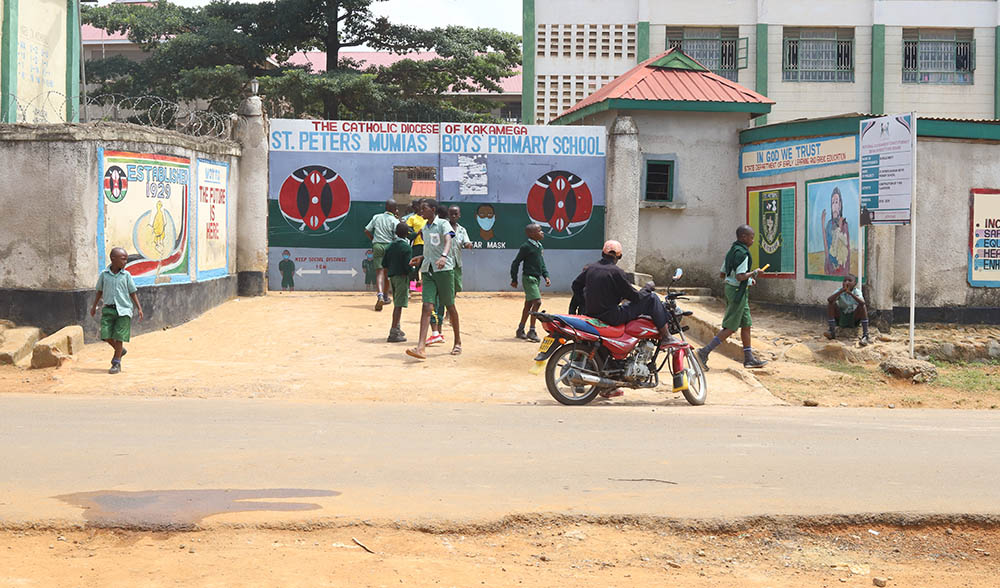
The entrance of St. Peter's Mumias Boys Primary School in western Kenya. Two of its students were among the top 20 in a national examination. (GSR photo/Doreen Ajiambo)
You have to accommodate all personalities and find common ground so that everyone walks in the same direction for the benefit of the school.
I start my day with prayer, and in everything I do, I include prayers. Because of this, people often think that I'm too much into prayer than teaching, yet from the prayers, the children would manifest some of the issues they were going through with their studies and at home.
After this award, I said God wanted me to go through some challenges so that he could give me happiness later.
What motivates you?
I believe that if I do well in what God has given me, I go to heaven. And also, bringing up the children spiritually and academically, ensuring the children's discipline, and seeing them become successful is a big motivation for me. I consider it to be a success.
What should we expect in the future?
My years of working for the government are running out since I am 59 years old, and the retirement age for a teacher is 60 years. However, if I get a chance to work with children and youth to assist them where I can, I would do that. I am motivated to continue this service, especially when I'm still very strong like this.
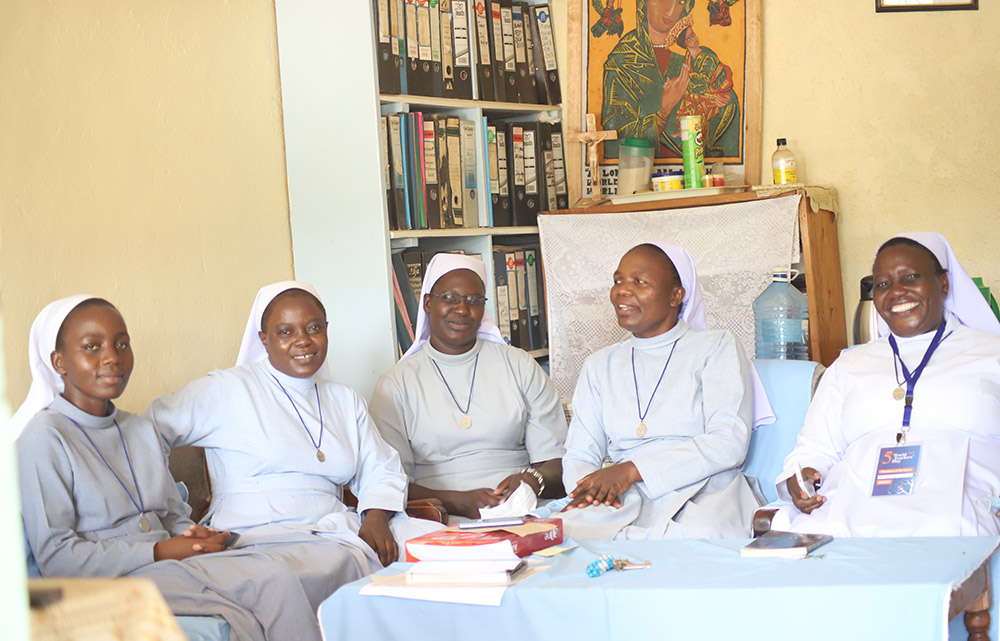
Sr. Anne Onyancha with other Sisters of Mary of Kakamega who serve on the staff of St. Peter's Mumias Boys Primary School in Kakamega, Kenya (GSR photo/Doreen Ajiambo)
How do you manage your various responsibilities?
To manage my responsibilities, I have a [schedule] that outlines when I have to be in the community to pray with the sisters. It allocates time for religious activities, and I also delegate my work well so that even if I'm not in school, I can get a proper report and act accordingly.
The [schedule] allows me to ensure that no side — the community, the religion and the school — gets to miss out on my responsibilities. I also believe that my religious life comes first. It is the foundation of everything else that I do, and if I don't do it well, I will also not do my apostolate well.
What would you advise other sisters who are educators like you?
I want to tell my fellow sisters in this profession that we must put our spiritual life first, and then the rest will be built on the spiritual life. When you put God first in everything, then you will succeed.
It is important to try our level best to ensure that our apostolate does not hinder us from doing the work of God. It is a good opportunity to teach children to know God that is my success formula within that apostolate.

